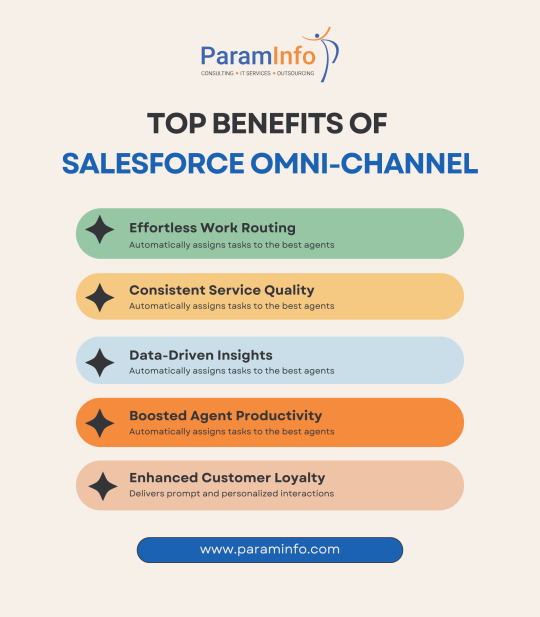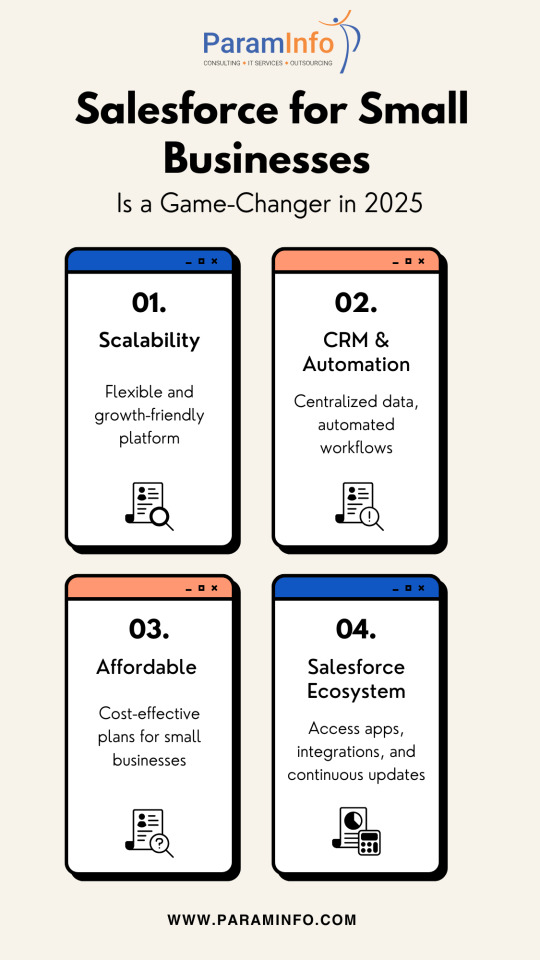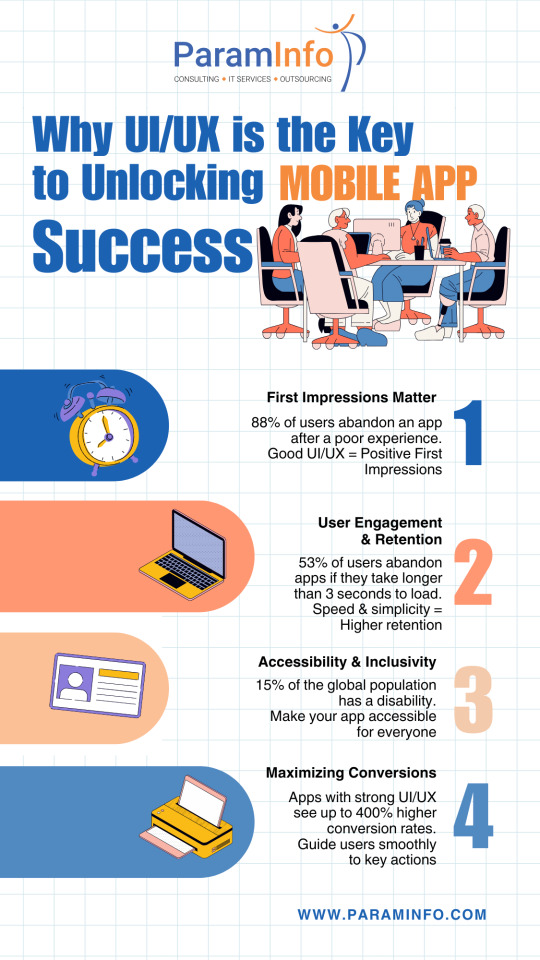Don't wanna be here? Send us removal request.
Text
Coloring the Future with Innovation – Happy Holi from Paraminfo!
May this Holi bring vibrant colors of joy, success, and new beginnings to you and your business. At Paraminfo, we blend creativity with technology to craft colorful digital solutions. Let’s celebrate the spirit of innovation this festive season! 🌈💻
🌸 Wishing you a safe and joyful Holi! Visit: paraminfo.com
#festivalofcolors#holi2025#holivibes#holicelebration#colorfulholi#Paraminfo#happyholi#TechWithColor#CelebrateInnovation
0 notes
Text

Elevate your brand with ParamInfo’s cutting-edge UI/UX solutions—designed to convert and captivate! ✨ Visit Paraminfo.com for to know more
#userexperience#ui ux company#ui ux agency#ui ux development services#ui ux design#ui ux development company#uiuxdesign#uidesign#user experience
0 notes
Text

Top 6 Benefits of Oracle E-Business Suite (EBS)
Is your business ready to scale and streamline? Oracle EBS might be the solution you’re looking for! This powerful suite offers:
✔ Streamlined operations with automation ✔ Enhanced decision-making through real-time insights ✔ Strong financial control and compliance
Check out our latest infographic and see how Oracle EBS can revolutionize your business! 🔗 Read the full blog here: Oracle E-Business Suite
0 notes
Text

Top Benefits of Salesforce Omni-Channel ✨
Customer expectations are higher than ever! 🌟 Salesforce Omni-Channel ensures your business meets them with ease. With intelligent routing, unified communication, and seamless workflows, it's the game-changer your business needs.
🌐 Why Choose Omni-Channel? 📌 Enhanced efficiency across channels 📌 Real-time task routing 📌 Consistent, high-quality service
🚀 Ready to elevate your customer service game? Start now!
#salesforce#salesforce crm#omnichannel#businessgrowth#customerexperience#tech#technology#software#businesssolutions#crm software#techsolutions#customerengagement#softwaredevelopment#saas#crm
0 notes
Text

💼 Why Salesforce for Small Businesses Is a Game-Changer in 2025 💡
Running a small business in today’s competitive market isn’t easy—but Salesforce is here to make it manageable, scalable, and efficient. Whether you’re looking to optimize operations, engage customers, or make data-driven decisions, Salesforce is your ultimate ally.
🚀 Here’s How Salesforce Can Transform Your Business:
Automate Your Workflow: Save time by automating repetitive tasks.
Smarter Decisions: Leverage real-time insights and analytics for better strategies.
Enhanced Customer Relationships: Build stronger, personalized connections that boost loyalty.
Scalability Without Limits: Grow seamlessly with tools designed for small businesses.
Affordable Solutions: Salesforce Starter gives you enterprise-grade tools at a price tailored for small companies.
💬 2025 is the year to embrace smarter tools. With Salesforce, small businesses can compete like never before.
🔗 Check out our full blog to dive deeper: Why Salesforce for Small Businesses Is Essential in 2025.
✨ Save and share if you’re ready to revolutionize your business with Salesforce!
#tech#technology#salesforce#businesssolutions#salesforce crm#crm software#crm services#erp software#erp solutions provider#techforbusiness#small business#business growth
0 notes
Text

Know Why UI/UX Design is the Secret Sauce Behind Mobile App Success
Great mobile apps aren't just built—they're designed with users in mind. 🌟
Here’s why UI/UX design is the backbone of any successful mobile app:
✨ First Impressions Count: 88% of users abandon an app after a poor experience. A clean, intuitive UI keeps them coming back.
🚀 Engagement & Retention: 53% of users won’t wait longer than 3 seconds for an app to load. A seamless experience keeps them hooked.
🌍 Accessibility Matters: 15% of the world’s population lives with some form of disability. Inclusive design ensures no one is left out.
🎨 Build Trust Through Design: 38% of users will leave an app that looks unattractive. A polished, professional interface = user loyalty.
💰 Conversions That Count: Apps with strong UI/UX design can see up to 400% higher conversion rates.
📊 Keep Improving: Regular updates based on analytics keep your app fresh and user-friendly.
🔑 Investing in the right UI/UX design services company can make all the difference between an app that gets deleted and one that thrives.
Want to know more about designing apps that users love? Let’s talk UI/UX!
#technology#tech#mobile app developer company#mobile app developers#mobile app development#mobile application development#software#ui ux design#ui ux company#ui ux development services#ui ux agency#user experience#userexperience#webdesign
1 note
·
View note
Text
From Monolithic to Modular: The Changing Architecture of Web Development

Today, developers are shifting toward modular, microservices-based architectures that allow for greater flexibility, scalability, and easier maintenance. But how did we get here? In this article, we explore the transition from monolithic architectures to modular web development, and how new web programming frameworks and technologies are helping developers build more efficient, scalable, and dynamic applications.
Understanding Monolithic Web Architecture
To understand how web development has evolved, it's essential to first grasp what monolithic architecture entails. In a monolithic architecture, all components of an application—front-end, back-end, database, and business logic—are tightly coupled into a single unit. Every request from the user triggers the entire application, causing the system to reload all resources. While monolithic systems worked well for small-scale projects, as businesses grew and required more complex functionalities, these applications became increasingly difficult to maintain and scale.
At this point, developers needed a solution that allowed for more flexibility and better scalability, leading to the rise of modular systems.
The Shift to Modular Architecture: Microservices and APIs
The concept of modular web development involves breaking down the monolithic application into smaller, more manageable pieces. This is where microservices and APIs come into play. With a modular architecture, developers break down the application into smaller, independent services that handle specific tasks or features. These services can operate autonomously and can be updated or replaced without affecting the entire application.
For instance, instead of building an entire e-commerce application in a single codebase, developers can break it down into distinct modules for payment processing, user management, inventory tracking, and order management. These individual services can then interact with each other seamlessly via APIs, enabling each service to be updated or scaled independently.
Frameworks like Node.js, Spring Boot, and Ruby on Rails are increasingly being used to build these modular applications. They make it easier to manage APIs and build scalable, responsive web applications.
Popular Web Development Frameworks for Modular Architecture
With the rise of modular and microservices-based web development, many new web application frameworks have emerged to help developers build and maintain complex, distributed systems. Some popular frameworks include:
Node.js: This is an open-source, cross-platform framework for building scalable network applications. Node.js is ideal for building modular applications as it supports asynchronous programming, allowing for real-time interactions and easy scaling.
Spring Boot: Java’s Spring Boot framework simplifies the development of stand-alone, production-grade Spring-based applications. It's designed for microservices, allowing developers to create small, independent services that communicate via APIs.
Ruby on Rails: Known for its simplicity and speed, Ruby on Rails allows developers to quickly build modular, database-driven web applications. It supports both monolithic and microservices architectures, making it a flexible choice for developers.
Django: A Python-based framework, Django is a powerful tool for building scalable, secure web applications. It offers features like built-in authentication and content management, which are essential for developing modular web applications.
These frameworks support modular development by offering built-in tools to manage APIs, databases, and service interactions, making it easier for developers to adopt microservices architectures.
Conclusion
The journey from monolithic to modular web development has been transformative, providing developers with the tools they need to build scalable, efficient, and interactive applications. With the shift to microservices and modular architectures, businesses now have the flexibility to build complex web applications that can grow with their needs.
The future of web development will likely see even more innovation, as web application frameworks evolve to meet the challenges of modern web applications. Whether you're building a new application or migrating from a legacy system, adopting a modular approach can provide significant advantages in terms of scalability, performance, and maintainability
0 notes
Text

Top Reasons to Choose Salesforce Consulting Services for Your Business
In today's competitive market, businesses are increasingly relying on sophisticated tools to manage their operations effectively. One such tool that stands out is Salesforce, a cloud-based customer relationship management (CRM) platform. Salesforce offers a wide range of functionalities that streamline business processes, improve customer engagement, and drive sales. However, adopting Salesforce and optimizing its use requires expertise, which is where Salesforce consulting services come into play.
Choosing the right Salesforce consulting partner can make a significant difference in how well the platform is implemented and utilized within your business. The role of a Salesforce Consulting Partner is to provide tailored advice, customization, and support to ensure that Salesforce meets the specific needs of your organization. In this blog, we’ll discuss the top reasons why businesses should consider Salesforce consulting services to enhance their CRM capabilities and achieve better results.
1. Expertise and Customization
Salesforce is a powerful platform with a multitude of features, but it can be overwhelming without the proper expertise. Salesforce services bring specialized knowledge and experience to the table, helping businesses customize Salesforce according to their unique requirements. From configuring modules like Sales Cloud or Service Cloud to creating custom workflows and automating processes, a skilled Salesforce Consulting Partner ensures that the platform is optimized to suit your business's goals.
Customizing Salesforce is essential because each business operates differently. A good consultant will work closely with your team to understand your needs, identify pain points, and develop solutions that maximize the platform's effectiveness. Custom solutions help your business get the most out of Salesforce, whether it's streamlining customer service operations, enhancing lead management, or automating manual tasks.
2. Seamless Implementation and Integration
When implementing Salesforce, one of the most critical factors is ensuring that the system integrates seamlessly with existing tools and processes. Businesses often struggle with system compatibility when introducing a new platform, which can lead to data discrepancies and workflow disruptions. Salesforce consulting services provide the expertise needed to ensure smooth integration between Salesforce and other platforms, such as marketing automation tools, ERP systems, or financial software.
A Salesforce consulting partner will also guide you through the entire implementation process—from data migration and system configuration to user training and ongoing support. With their help, you can be confident that Salesforce will integrate smoothly with your existing workflows, reducing downtime and ensuring a smooth transition.
3. Ongoing Support and Maintenance
Once Salesforce is implemented, it’s essential to have ongoing support to ensure that the system continues to function as expected. Salesforce consulting services provide businesses with long-term assistance, helping to troubleshoot issues, perform system updates, and make improvements as necessary. Regular system maintenance ensures that your business continues to benefit from the latest Salesforce features and enhancements.
Consultants also offer training for your team, ensuring that they understand how to make the most of Salesforce. As your business evolves, the consulting partner can adjust your Salesforce configuration to meet new needs, such as adding new modules or integrating additional third-party systems.
4. Maximizing ROI with Best Practices
Salesforce can be a significant investment for any business, so it’s crucial to maximize the return on that investment. A Salesforce consulting partner will guide you through industry best practices, helping you implement strategies that boost efficiency, increase sales, and enhance customer engagement. These best practices are based on proven methods that have helped countless businesses optimize their Salesforce implementation.
By following best practices, businesses can avoid common pitfalls, reduce unnecessary costs, and unlock the full potential of Salesforce. Whether it’s optimizing data management, automating repetitive tasks, or leveraging advanced analytics, a Salesforce consulting partner will ensure you’re getting the most out of your Salesforce investment.
5. Scalability and Flexibility
As businesses grow, their CRM needs evolve, and Salesforce provides a scalable solution that can adapt to these changes. However, scaling Salesforce effectively requires careful planning and expertise. Salesforce consulting services help businesses scale their Salesforce implementation to accommodate growth—whether it's adding new users, expanding to new regions, or integrating additional services.
A Salesforce Consulting Partner can provide insights into how to expand Salesforce’s capabilities while maintaining a smooth user experience. This ensures that your system remains flexible, capable of handling your business’s changing demands, and capable of supporting future growth.
6. Enhancing Customer Relationships
At the core of Salesforce is its ability to help businesses manage customer relationships more effectively. With a wealth of data at your fingertips, Salesforce helps businesses understand customer behavior, track interactions, and personalize marketing efforts. However, to leverage these capabilities fully, businesses need expert guidance on how to use Salesforce’s tools to their advantage.
Salesforce consulting services enable businesses to set up personalized dashboards, automate customer interactions, and provide real-time insights into customer behavior. These features help businesses enhance customer relationships, increase satisfaction, and drive customer loyalty. By working with a Salesforce Consulting Partner, companies can ensure that their CRM strategy is aligned with their customer engagement goals.
Conclusion
In conclusion, Salesforce consulting services are essential for businesses looking to optimize their Salesforce investment and achieve better results. By leveraging the expertise of a trusted Salesforce consulting partner, businesses can enjoy smoother implementation, seamless integration, and ongoing support that ensures Salesforce remains an asset in the long term.
Whether it's customizing Salesforce to fit unique business needs, improving data management, or driving growth through better customer engagement, Salesforce professional services help organizations unlock the full potential of the Salesforce platform. Choosing the right consulting partner is the key to achieving success with Salesforce and ensuring that your business remains competitive in the marketplace
#tech#technology#salesforce crm#salesforce#saas technology#businesssolutions#software#businessefficiency
0 notes
Text

Leveraging Oracle SQL Developer Tools for Streamlined Database Management
In the world of database management, efficiency, and performance are paramount. Oracle SQL Developer tools have long been a staple for database administrators, developers, and IT professionals looking to optimize database environments. Whether you are managing a large-scale Oracle Database or integrating with Oracle E-Business Suite (EBS), having the right tools at your disposal can dramatically improve workflow efficiency and data management capabilities.
This blog will explore the powerful features of Oracle SQL Developer, focusing on its role in managing databases and supporting Oracle E-Business Suite environments. We’ll cover essential features, best practices, and how SQL Developer can help streamline database management tasks in your organization.
What is Oracle SQL Developer?
Oracle SQL Developer is an integrated development environment (IDE) provided by Oracle that allows database developers, administrators, and users to manage Oracle databases with ease. This free tool is designed to simplify database tasks like querying, reporting, and database management. SQL Developer supports both Oracle and non-Oracle databases, making it a versatile option for database administration.
The tool offers a graphical interface to interact with databases, allowing users to run SQL queries, manage database objects, generate reports, and analyze execution plans. It also features integration with other Oracle products like Oracle E-Business Suite, providing a cohesive environment for managing enterprise-level applications.
Key Features of Oracle SQL Developer
SQL Querying and Development: SQL Developer’s query editor offers syntax highlighting, code completion, and auto-formatting, making it easier to write and execute SQL queries. For those working with Oracle E-Business Suite, it’s essential to be able to query databases efficiently for insights into financials, supply chain management, HR, and more.
Database Management: SQL Developer makes managing database objects a breeze. It provides a tree-like view of database structures, allowing users to easily navigate and modify tables, views, and stored procedures. It’s an invaluable tool for administrators managing complex Oracle Database environments, especially when supporting Oracle E-Business Suite.
Database Migration: SQL Developer supports data migration between Oracle databases and even to/from non-Oracle systems. For businesses using Oracle EBS, migrating data between versions or to cloud environments becomes more straightforward. This feature is particularly useful during cloud migrations, ensuring a seamless transition without data loss.
Reports and Analytics: With built-in reporting tools, SQL Developer allows users to generate detailed reports from SQL queries. This is highly beneficial for administrators and managers needing insights from Oracle E-Business Suite data to make informed decisions in areas like finance, operations, and HR.
PL/SQL Debugging: Debugging PL/SQL code is essential for identifying and fixing issues in custom applications or reports developed for Oracle E-Business Suite. SQL Developer’s debugging tools allow you to step through code, inspect variables, and resolve issues efficiently.
Version Control Integration: For teams collaborating on database development and modification, SQL Developer supports version control integration with systems like Git. This ensures that changes to Oracle E-Business Suite customizations and configurations can be tracked, backed up, and reverted if necessary.
How Oracle SQL Developer Enhances Oracle E-Business Suite Management
Oracle E-Business Suite (EBS) consists of several interconnected applications for managing critical business functions such as finance, supply chain, HR, and procurement. EBS uses Oracle Databases to store vast amounts of transactional and operational data. To ensure optimal performance and reliability, it’s vital to manage and query the database effectively.
Oracle SQL Developer simplifies the administration of Oracle EBS databases in the following ways:
Efficient Querying of EBS Data: Oracle SQL Developer allows database administrators to easily query and analyze the vast amount of data stored in Oracle EBS. Whether it’s pulling financial reports, analyzing inventory levels, or reviewing HR data, SQL Developer makes it easy to access and manipulate the data stored in Oracle databases, ensuring that businesses can make informed decisions.
Customizing EBS Reports: Oracle EBS allows businesses to tailor reports to their specific needs, but this requires SQL and PL/SQL knowledge. SQL Developer’s rich editing and debugging tools make it easier to create, troubleshoot, and fine-tune these reports, enabling organizations to extract the exact data they need.
Database Performance Tuning: Performance optimization is crucial for ensuring Oracle EBS runs smoothly. SQL Developer helps administrators analyze query execution plans, identify slow-performing queries, and optimize database operations. This is particularly important when dealing with large Oracle EBS environments, as inefficient queries can impact performance across the entire system.
Data Migration for EBS Upgrades: When businesses need to upgrade Oracle EBS or migrate data to a new instance, SQL Developer offers tools to automate and streamline the data migration process. This ensures that critical EBS data is safely transferred without disruptions to business operations.
Integration with Oracle Cloud: As more businesses adopt Oracle Cloud Infrastructure (OCI), SQL Developer provides seamless integration with cloud environments, enabling EBS users to manage both on-premise and cloud-based Oracle databases. This integration is essential for businesses transitioning to hybrid cloud environments and needing to maintain compatibility between legacy on-premise systems and modern cloud applications.
Best Practices for Using Oracle SQL Developer
To get the most out of Oracle SQL Developer, it’s important to adopt best practices for usage:
Use Version Control for EBS Customizations: When customizing Oracle EBS or creating custom reports, make sure to use version control systems to track changes. This practice helps prevent errors and enables the team to revert to previous versions if needed.
Regularly Monitor and Optimize Database Performance: Use SQL Developer’s tools to regularly monitor your Oracle EBS database performance. Identify long-running queries or inefficient processes and optimize them to ensure the system runs smoothly.
Automate Routine Tasks: SQL Developer supports automation through scripts. Automate repetitive tasks like data imports, backups, and report generation to improve efficiency and reduce manual intervention.
Ensure Consistent Backups: Always ensure that your Oracle EBS database is backed up regularly. SQL Developer can help automate backups and recovery processes, minimizing downtime in case of failures.
Leverage Community Resources: SQL Developer has a vibrant user community and extensive documentation. If you run into issues or need help with specific Oracle EBS queries, tap into the community for advice and troubleshooting tips.
Conclusion
Oracle SQL Developer is an indispensable tool for database administrators and developers working with Oracle E-Business Suite. By simplifying the management of Oracle databases, streamlining querying processes, and supporting data migration and integration with cloud environments, SQL Developer makes managing large-scale Oracle EBS systems easier than ever.
By adopting best practices and leveraging SQL Developer’s extensive features, organizations can optimize their Oracle E-Business Suite environments, improve performance, and ensure smooth operations. Whether you’re troubleshooting complex issues, customizing reports, or migrating data to the cloud, SQL Developer empowers teams to work more efficiently and effectively.
0 notes
Text

Mobile App Development: Trends You Can’t Ignore
Mobile app development is a fast-paced field that continually evolves, driven by technological advancements and changing user expectations. For businesses looking to harness the power of mobile applications, understanding the latest trends is crucial. This post will outline the most significant trends in mobile app development, helping you stay informed and competitive in the marketplace.
No-Code Development: Democratizing App Creation
The rise of no-code development platforms is a game-changer for mobile app development. These platforms enable individuals without coding experience to build functional applications quickly.
For businesses, this means reduced development costs and the ability to iterate rapidly based on user feedback. By democratizing app creation, no-code platforms allow companies to innovate and experiment without the constraints of traditional development processes. At Paraminfo, we recognize the potential of no-code solutions and incorporate them into our development strategies.
AI-Powered Personalization
Artificial intelligence is at the forefront of mobile app innovation, enabling developers to create personalized user experiences. By analyzing user data and behavior, AI can help apps adapt to individual preferences and deliver tailored content.
This level of personalization enhances user engagement and satisfaction, driving customer loyalty. Businesses that leverage AI in their mobile apps are better positioned to meet evolving consumer needs. For a closer look at integrating AI into mobile apps, check out our comprehensive guide on insurance mobile app development.
Security Measures: A Non-Negotiable
As data privacy concerns grow, mobile app developers must prioritize security measures. Users are increasingly vigilant about the safety of their personal information, making it essential for businesses to implement robust security protocols.
From encryption to secure authentication processes, developers must integrate security features into every stage of the app development process. A commitment to security builds trust and can significantly enhance a brand's reputation.
User-Centric Design: The Key to Success
User-centric design is fundamental to mobile app development. An intuitive and appealing design can make a significant difference in user satisfaction and retention.
By prioritizing user feedback and conducting usability testing, businesses can ensure that their mobile applications meet user expectations. A well-designed app not only enhances user experience but also contributes to a positive brand image.
The Role of Cross-Platform Development
Cross-platform development frameworks are gaining popularity, allowing developers to create applications that function seamlessly across different platforms. This approach can save time and resources, enabling businesses to reach a wider audience.
With cross-platform solutions, organizations can deliver consistent user experiences regardless of the device used. This flexibility is essential in today’s diverse mobile landscape.
Conclusion
Mobile app development is an exciting and dynamic field, with trends that continually reshape the landscape. By embracing no-code development, AI-powered personalization, robust security measures, user-centric design, and cross-platform strategies, businesses can create successful applications that resonate with users. For more insights on mobile app development, visit our service page and explore our detailed guide on insurance mobile app development.
#mobile application development#mobile app development#tech#technology#mobile app developers#mobile app company#mobile app developer company
0 notes
Text

Navigating the Future: Essential Web Development Trends for 2025
As the digital realm evolves, the landscape of web development is shifting, presenting new challenges and opportunities for businesses. With 2025 on the horizon, emerging trends promise to reshape how companies engage with their customers online. Understanding these trends is crucial for developers aiming to create impactful and dynamic applications that meet modern user expectations. For businesses looking to stay ahead, exploring resources from Paraminfo can be invaluable.
One pivotal trend is the growing demand for websites that provide a seamless and accessible experience across various devices. As mobile device usage continues to surge, ensuring a smooth user experience has become vital for businesses. Companies eager to enhance their web interfaces can find invaluable support through Paraminfo's UI/UX Design Services.
Key Web Development Trends to Watch
Artificial Intelligence (AI): AI remains a transformative force in web development, extending its reach beyond content creation. AI-powered chatbots and dynamic content generation are changing user interactions, personalizing experiences, and driving customer engagement.
Dark Mode: Dark mode continues to gain popularity, offering a visually appealing alternative that reduces eye strain and improves readability. As more platforms adopt this feature, it has become a user-preferred option, especially during nighttime use.
Voice-Based Search Optimization: The rise of intelligent virtual assistants has elevated the importance of optimizing applications for voice search. As more users rely on voice commands for online navigation, this trend is poised to reshape web development strategies.
Serverless Architecture: The shift towards serverless architecture allows developers to focus more on coding and less on infrastructure management. By leveraging cloud-based solutions, developers can streamline their workflows and reduce operational costs.
Progressive Web Apps (PWAs): PWAs are revolutionizing web experiences by combining the best of web and mobile applications. With a single codebase that enables cross-platform functionality, businesses can deliver faster and more responsive applications.
What Lies Ahead in 2025?
As we look toward 2025, staying informed about these trends will be critical for success in web development. Key priorities will include a focus on data privacy and user experience, ensuring that businesses can adapt to ever-evolving user needs.
Conclusion Keeping pace with emerging trends is essential for businesses striving to remain competitive in the digital landscape. By prioritizing user experience, data security, and personalized interactions, developers can craft innovative web applications that resonate with users.
If you're ready to elevate your business through exceptional UI/UX design, explore our services at Paraminfo. For more insights into the transformative web development trends shaping the future, delve deeper into our resources and check out the full blog on key web development trends.
#WebDevelopment#UIUXDesign#ArtificialIntelligence#VoiceSearch#ServerlessArchitecture#DarkMode#ProgressiveWebApps#WebTrends2025
0 notes
Text

Microsoft Azure 2024: Leading the Way in Cloud Services
Azure’s continuous advancements in AI, data, and edge computing make it a go-to platform for businesses looking to transform their operations.
Artificial Intelligence Azure AI and Machine Learning services offer businesses innovative tools to integrate AI into their workflows seamlessly.
🔗 Explore how Microsoft Azure can enhance your cloud strategy!
Data Analytics Azure’s advanced analytics services allow companies to process vast amounts of data quickly, driving business decisions.
Edge IoT With updates to Azure IoT Hub and Azure Digital Twins, businesses can now manage their IoT operations efficiently and process data closer to its origin.
🔗 Ready to enhance your cloud strategy? Discover more in our full blog!
Footer: Interested in enhancing your business operations? Discover how Paraminfo can assist you.
0 notes
Text

Unlock the Full Potential of SAP S/4HANA for Your Business
In the era of digital transformation, SAP S/4HANA is helping companies streamline operations, automate processes, and make better, data-driven decisions. From finance to supply chain, this next-gen ERP system offers modules tailored to meet the unique needs of modern businesses.
Finance Module: Real-Time Insights for Smarter Decisions SAP S/4HANA Finance gives businesses real-time access to their financial health, helping them manage liquidity and profitability while ensuring compliance with international standards.
Sales & Distribution: Enhanced Customer Experience Optimize your sales process from order creation to delivery and billing with SAP’s Sales and Distribution module, improving inventory control and reducing errors.
Supply Chain Management: From Procurement to Delivery With SAP S/4HANA’s SCM module, you can manage the entire supply chain efficiently, ensuring timely deliveries and minimizing operational disruptions.
🔗 Learn more about how SAP S/4HANA can transform your business by reading our full blog!
Interested in enhancing your business operations? Discover how Paraminfo can assist you
0 notes
Text

Why Your Business Needs Salesforce CRM in 2024
In the ever-changing world of business, finding the right tools is crucial for success. Salesforce CRM is a powerful solution designed to help businesses thrive in 2024.
Boosting Productivity: Salesforce CRM integrates sales and marketing functions, making operations more efficient. This allows teams to focus on what really matters—serving customers!
Streamlining Operations: With its user-friendly interface, Salesforce simplifies complex processes. Customize the platform to meet your business needs for smoother workflows.
Enhancing Customer Relationships: Manage customer data effectively to foster strong connections. Salesforce CRM helps personalize interactions, building trust and loyalty.
Marketing Automation: Run targeted campaigns with Salesforce’s automation tools. Engage customers across multiple channels for better outreach.
Collaboration with Slack: Salesforce’s integration with Slack keeps teams connected, even in remote work environments. Seamless communication leads to enhanced productivity.
AI-Powered Insights: Leverage Salesforce Einstein for powerful analytics. Understand customer behavior and make informed decisions to stay ahead of the competition.
In summary, Salesforce CRM is essential for businesses looking to succeed in 2024.
🔗 Find out how Salesforce CRM can transform your business! Check out our detailed blog for more insights, or explore our offerings to discover the perfect solutions for your needs.
#salesforce#sales#CustomerExperience#salesforce crm#businesssolutions#crm software#sales productivity#crm
0 notes
Text
Is Your Network Infrastructure Ready for 2024?
In today’s hyperconnected world, businesses can't afford network failures. A robust network infrastructure is essential for seamless communication, enhanced security, and business growth. Learn how a strong network can help your business stay competitive and future-proof in 2024. 🌐🔒
Discover key insights and tips in our latest blog! [Read more here] (Read our Full Blog Here)
#NetworkInfrastructure#BusinessGrowth#TechTrends#2024Tech#BusinessSuccess#DataSecurity#DigitalTransformation#TechInnovation
0 notes
Text
2024 Mobile App Development Mastery: From Concept to Launch

As mobile apps continue to dominate the digital world, businesses that harness their power can stay ahead of the curve. Technologies like AI, 5G, and IoT are redefining the potential for mobile apps, offering immense growth opportunities.
Why Is Mobile App Development a Must for Businesses?
Developing a mobile app in today’s landscape allows you to:
Boost customer engagement with innovative mobile features
Streamline internal processes with custom mobile solutions
Create new revenue streams in an ever-growing mobile market
Stay ahead of competitors by leading in digital transformation
Mobile App Types to Consider:
Native Apps: Built for either iOS or Android, delivering top-tier performance and access to device-specific features.
Hybrid Apps: Combining web technologies with native functionalities, these apps provide a cost-effective, cross-platform solution.
Web Apps: Browser-based apps that offer a streamlined, mobile-like experience at a fraction of the development cost.
Breaking Down the Mobile App Development Process:
A clear development process can turn your idea into reality:
Define your strategy and concept
Design an intuitive user interface
Develop and code the app with high-quality performance
Test rigorously to ensure functionality and usability
Launch with a plan to maximize market impact
Want more insights? Visit our full blog for a comprehensive guide to mastering mobile app development in 2024!
#app development#mobile app developers#mobile app development#tech#technology#app developers#mobile application development
0 notes
